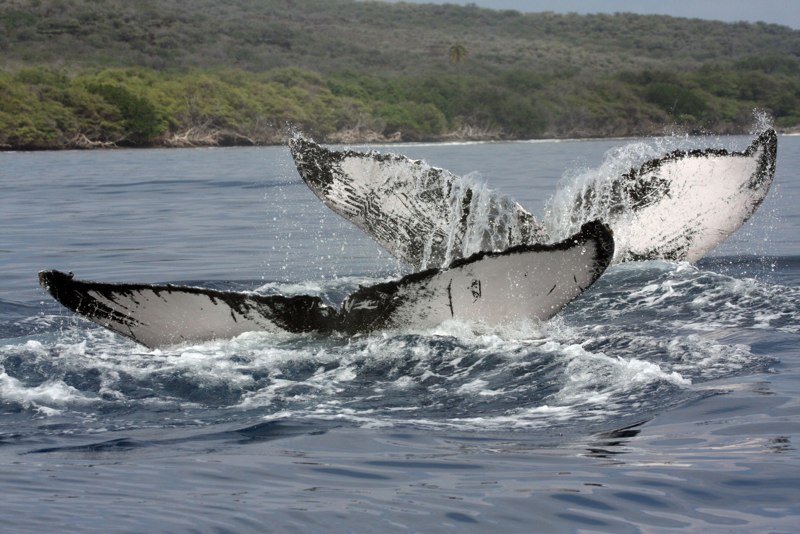Maui Marine Life
Dolphins
Dolphins are part of the same family as porpoises and whales, all called cetaceans. The cetacean family includes the world’s largest and most diverse group of living animals. Dolphins are mammals that nurse their young. There are more than fifteen species of wild dolphin that live in or migrate to waters surrounding the Hawaiian Islands. The Hawaiian spinner dolphin, Pan tropical spotted dolphin and bottlenose dolphin are the species most frequently seen.
Humpback Whales
Each Fall humpback whales travel 3,000 miles from their Northern feeding grounds to the warm tropical waters of the Hawaiian Islands. The warm safe waters are perfect for these whales to mate and give birth. These baleen whales grow to over 50 feet long and can weigh anywhere from 30-50 tons! They are especially admired for their spectacular acrobatics as well as their complex songs. There are about 20,000 of these whales worldwide and are considered an endangered species. They begin to arrive around Maui in November, however the official season is December through May.
Monk Seals
Unlike most seals, Hawaiian Monk Seals are solitary animals that are rarely found in groups. They are a very old species; scientists believe that they have remained unchanged by evolution for the past 15 million years. They are primarily found in the remote regions of the Northwestern Hawaiian Islands. Like many species native to Hawaii, they evolved in the absence of predators. As such, they did not develop a “fight-or-flight” instinct, and are therefore naturally tame. This spelled disaster for the Monk Seal during the 19th century, as they were killed in large numbers for their oil and pelts. Today they are considered an endangered species, with a population of around 1,500. Because the survival of these gentle creatures remains precarious, it is important that visitors not disturb them—please stay a safe distance away.
Turtles
Of the three native Hawaiian species, the most common is the green sea turtle. This is the largest of the hard-shelled turtles weighing up to 440 pounds and measuring up to 4 feet. Hawaii’s green sea turtles reach sexual maturity at around 25 years. They can migrate up to 800 miles away from their feeding areas near the coasts of main islands, to nesting beaches in the Northwestern Hawaiian Islands. From one to 350 females nest each year, coming to shore several times in one season. It will be two to three years before the same female will nest again. While each nest averages 100 eggs, only a few of the hatchlings will survive to adulthood. Sea turtles have been known to move through the water as fast as 35 mph. When active, sea turtles swim to the surface every few minutes in order to breathe. When sleeping or resting, which usually occurs at night, adult sea turtles can remain underwater for more than 2 hours without breathing. Juvenile sea turtles have not developed this ability as well as adults and must sleep afloat at the water’s surface. It takes this turtle almost two decades to reach an adult breeding size of 200 pounds or more. Living up to eighty years they can reach up to 350 pounds
Fish
There are an estimated 700 different species of fish in Hawaiian waters, many of which exist nowhere else in the world. Impress your friends by telling them about Hawaii’s state fish, the Humuhumunukunukuapua’a (pronounced HOO-moo-HOO-moo-NEW-coo-NEW-coo-AH-poo-AH-ah), or the reef triggerfish. This tiny tropical fish is 8-9 in. long and has a trigger-shaped, blue-and-yellow dorsal fin. More than 20 percent of Hawaiian reef fishes are found nowhere else in the world. Several are especially common and easily recognized by snorkelers and divers while others are rare. These endemic species are especially well-represented in the pristine reefs surrounding the island of Lanai.






